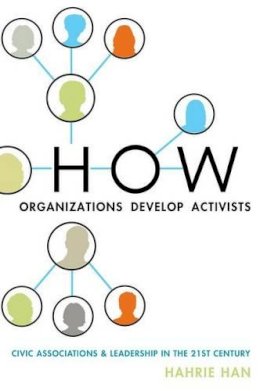
Stock image for illustration purposes only - book cover, edition or condition may vary.
How Organizations Develop Activists: Civic Associations and Leadership in the 21st Century
Hahrie Han
€ 62.76
FREE Delivery in Ireland
Description for How Organizations Develop Activists: Civic Associations and Leadership in the 21st Century
Paperback. Num Pages: 250 pages, black & white illustrations. BIC Classification: GTC; JPA; KNT. Category: (G) General (US: Trade). Dimension: 236 x 156 x 22. Weight in Grams: 406.
Why are some civic associations better than others at getting--and keeping--people involved in activism? From MoveOn.org to the National Rifle Association, Health Care for America Now to the Sierra Club, membership-based civic associations constantly seek to engage people in civic and political action. What makes some more effective than others? Using in-person observations, surveys, and field experiments, this book compares organizations with strong records of engaging people in health and environmental politics to those with weaker records. To build power, civic associations need quality and quantity (or depth and breadth) of activism. They need lots of people to take action and also a cadre of leaders to develop and execute that activity. Yet, models for how to develop activists and leaders are not necessarily transparent. This book provides these models to help associations build the power they want and support a healthy democracy. In particular, the book examines organizing, mobilizing, and lone wolf models of engagement and shows how highly active associations blend mobilizing and organizing to transform their members' motivations and capacities for involvement. This is not a simple story about the power of offline versus online organizing. Instead, it is a story about how associations can blend both online and offline strategies to build their activist base. In this compelling book, Hahrie Han explains how civic associations can invest in their members and build the capacity they need to inspire action.
Product Details
Publisher
Oxford University Press Inc
Format
Paperback
Publication date
2014
Condition
New
Weight
405g
Number of Pages
250
Place of Publication
New York, United States
ISBN
9780199336777
SKU
V9780199336777
Shipping Time
Usually ships in 15 to 20 working days
Ref
99-99
About Hahrie Han
Hahrie Han is Associate Professor of Political Science at Wellesley College.
Reviews for How Organizations Develop Activists: Civic Associations and Leadership in the 21st Century
How Organizations Develop Activists examines the strategies deployed by civic associations in order to encourage the delivery of better and more work by their activists.
Adriana Rudling, Political Studies Review
... offers valuable insights for both practitioners and students of organizations and activism.
J. Heyrman, Berea College, CHOICE
For all the scholarship on social movements and civic associations, surprisingly little research has focused on the issue of organizational effectiveness. Han's book should go a long way toward filling this gap. Using a mix of comparative case analysis and field experiments, the author offers an empirically rich, analytically compelling account of why some associations succeed in mobilizing effective collective action, while so many others fail-often spectacularly- to do so. This book deserves the widest possible audience in political science, sociology and, most importantly, among those who aspire to successful grass roots activism.
Doug McAdam, author of Freedom Summer
As organizers, we know that winning real change begins with real people, but it's not always easy to know what strategies are most effective for engaging people in ways that build power. How Organizations Develop Activists fills that gap, and is a must-read for any organizer or organization looking to build people power.
Ai-jen Poo, Director of the National Domestic Workers Alliance and co-director of Caring Across Generations
Effective citizens' movements need to do much more than raise money and recruit the right individual adherents. Helping members become fully engaged and developing good volunteer leaders are the keys to having a real impact
and Hahrie Han's pathbreaking research shows exactly how these challenges can be met with well-designed organizational strategies. Her book is a must-read for all who care about making American democracy more vibrant and powerful.Theda Skocpol, Victor S. Thomas Professor of Government and Sociology, Harvard University, and Director, Scholars Strategy Network
Adriana Rudling, Political Studies Review
... offers valuable insights for both practitioners and students of organizations and activism.
J. Heyrman, Berea College, CHOICE
For all the scholarship on social movements and civic associations, surprisingly little research has focused on the issue of organizational effectiveness. Han's book should go a long way toward filling this gap. Using a mix of comparative case analysis and field experiments, the author offers an empirically rich, analytically compelling account of why some associations succeed in mobilizing effective collective action, while so many others fail-often spectacularly- to do so. This book deserves the widest possible audience in political science, sociology and, most importantly, among those who aspire to successful grass roots activism.
Doug McAdam, author of Freedom Summer
As organizers, we know that winning real change begins with real people, but it's not always easy to know what strategies are most effective for engaging people in ways that build power. How Organizations Develop Activists fills that gap, and is a must-read for any organizer or organization looking to build people power.
Ai-jen Poo, Director of the National Domestic Workers Alliance and co-director of Caring Across Generations
Effective citizens' movements need to do much more than raise money and recruit the right individual adherents. Helping members become fully engaged and developing good volunteer leaders are the keys to having a real impact
and Hahrie Han's pathbreaking research shows exactly how these challenges can be met with well-designed organizational strategies. Her book is a must-read for all who care about making American democracy more vibrant and powerful.Theda Skocpol, Victor S. Thomas Professor of Government and Sociology, Harvard University, and Director, Scholars Strategy Network
